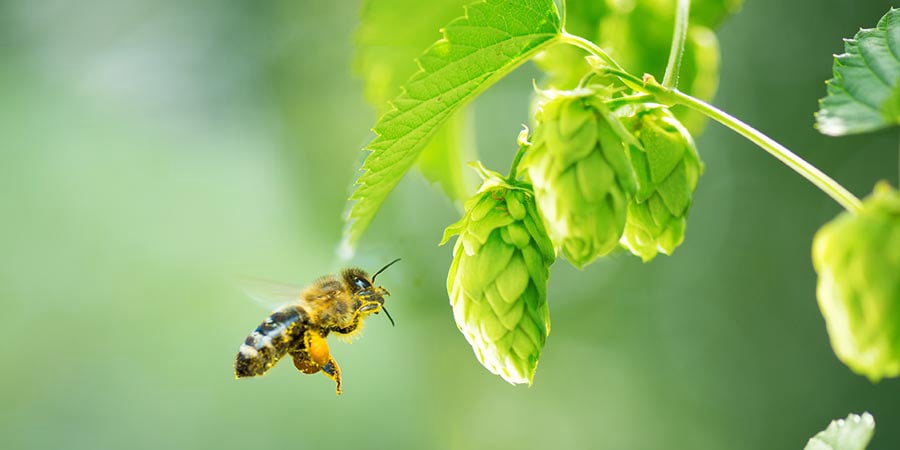

The EPA in the USA has registered a new biochemical miticide, Potassium Salts of Hops Beta Acids (K-HBAs), which is intended to provide another option for beekeepers to combat the devastating effects of the Varroa mite on honey bee colonies and to avoid the development of resistance toward other products. Rotating products to combat Varroa mites is an important tactic to prevent resistance development and to maintain the usefulness of individual pesticides.
The registrant, a company called Beta Tech Hop Products, derived K-HBAs from the cones of female hop plants, Humulus lupulus. To control mites on honey bees, the product is applied inside commercial beehives via plastic strips.
Varroa mites are parasites that feed on developing bees, leading to brood mortality and reduced lifespan of worker bees. They also transmit numerous honeybee diseases. The health of a colony can be critically damaged by an infestation of Varroa mites. Once infested, if left untreated, the colony will likely die.
This biochemical, like all biopesticides, is a naturally-occurring substance with minimal toxicity and a non-toxic mode of action against the target pest(s). There are numerous advantages to using biopesticides, including reduced toxicity to other organisms (not intended to be affected), effectiveness in small quantities, and reduced environmental impact.
A 2012 study, found 100% of mites placed on a bee, wiped down with a 1 percent HBA solution, died. The bee was not affected by the solution. The same study placed strips of cardboard treated with HBA in bee colonies. When these colonies were compared to colonies not treated with the strips, it was found that more mites fell off the bees in the hives guarded by the HBA cardboard.
In October of 2015, the EPA approved the use of this biochemical pesticide around hives. The EPA was able to release it for use without further safety testing due to its long history of use in brewing and as a meat preservative. With such a long history of human exposure, it has been acknowledged as a safe-to-use substance.

● As a brewer, choose to buy local if you plan to use honey as a brewing ingredient. This supports your local beekeeper’s who are having a hard time of it.
● Plant local bee friendly plants such as red clover, bee balm, foxglove, asters, sunflowers and grow hops.
● Donate to research, education, and community outreach on behalf of the honeybee, if moved to do so, and petition to get pesticides that might be adversely affecting bee populations banned.
● Stop using pesticides that may be linked to the bees’ problems. Find new respect for flowering weeds, don’t think of them as a blot on your landscape, but a much-needed nectar drive-thru for local bees. Those dandelions that spot your lawn aren’t bad, in fact, it isn’t just the bees that can use them. You can eat the leaves, make tea from the roots, and brew with the flowers I myself have used them in a mead.
● Make a herb garden that will benefit the bees, your culinary explorations, and a hop garden that will benefit your brewing.